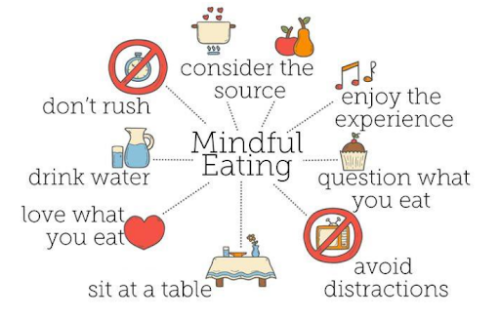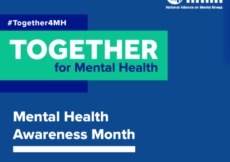November 18th, 2021
Mindful Eating
By Jennifer Yoon, RDN, LDN, IBCLC
AHN Pediatrics — Pediatric Alliance St. Clair
* * * * * * * *
Child obesity and overweight are increasing at epidemic rates in this country, especially during the pandemic. The PediaBlog is pleased to highlight a series of articles written by Jennifer Yoon related to this important topic. We hope by posting these articles once a week for the next few weeks parents will gain some useful ideas to help combat this alarming problem.
This post originally appeared on The PediaBlog on March 31, 2020.
Watch Jennifer and Dr. Ned Ketyer discuss child obesity and overweight on Facebook Live from 10/28/21 here.
* * * * * * * *
Mindful eating is about using mindfulness to reach a state of full attention to your experiences, cravings, and physical cues when eating. Mindful eating involves eating slowly and without distraction, listening to physical hunger cues, and eating only until you are satisfied.
Mindful eating focuses on listening to the body and eating only until satisfied. Habits such as skipping meals, eating too quickly, eating while distracted, and emotional eating can result in eating beyond satisfaction or even beyond fullness. To eat more mindfully and avoid overeating, eat slowly, take small bites, drink water before and throughout the meal, and check in with your hunger often. Put small portions on your plate and ensure you are still hungry before getting more. Stop eating when you are satisfied. Practice this with your children as well, and allow them to listen to their own hunger and satiety rather than encouraging them to finish their plate.
Mindful eating also means eating when the body is physically hungry and not for other reasons. Feelings of stress, boredom, sadness, fatigue, tension, etc., should be addressed in other ways. Exercise or movement breaks, listening to music, talking to a friend (actually talking not texting), playing with or walking a pet, dancing, meditating, taking a short nap, yoga, and more are healthy ways to work through feelings rather than eating. Correcting stress and emotional eating is a huge step toward healthy eating habits and provides a great example to kids.
Distracted eating is the opposite of mindful eating. Eating while working, doing homework, driving, watching TV, or scrolling through a gadget results in overeating and a lack of enjoyment of the food. Eating foods in healthy portions, in a quiet environment, with screens off, increases the enjoyment of the food and allows for an awareness of the body’s hunger and satiety.
Adequate sleep is an important part of mindful eating. According to the National Sleep Foundation:
A lack of sleep is linked to overeating because the two hormones that help regulate hunger — ghrelin and leptin — are affected by sleep: Ghrelin stimulates appetite, while leptin decreases it. When the body is sleep-deprived, the level of ghrelin spikes, while the level of leptin falls, leading to an increase in hunger… In fact, people who don’t get enough sleep eat twice as much fat and more than 300 extra calories the next day, compared with those who sleep for eight hours. Not only does a lack of sleep interfere with hunger signals, but less time in bed simply gives you more hours of the day to eat. Preventing overeating — as well as obesity — starts with creating a healthy bedtime routine. To manage your weight and how much food you consume, aim to go to sleep and wake up at the same time every day of the week, and give yourself enough time in bed to get seven to nine hours of sleep.
Mindful eating encourages the enjoyment of food and honoring your hunger. Enjoy the process of selecting healthy, fresh foods and preparing them in different ways. Create! Slow down and experience the food — its appearance, color, smell, and flavor. Focus on the food you are eating and the enjoyment of the people around you, or perhaps the quiet and peace when eating alone. If there is a food you really want that may not be the healthiest choice, have a small amount, really taste it and enjoy it, stop when you are satisfied, and give yourself permission to eat it again when you really want it. This practice reduces the guilt of forbidden foods.
*** Jennifer Yoon sees patients at the AHN Pediatrics — Pediatric Alliance St. Clair office. For an appointment, please call (412) 221-2121. Read more from Jennifer’s “Nutrition 4 Kids” column on The PediaBlog here.






































